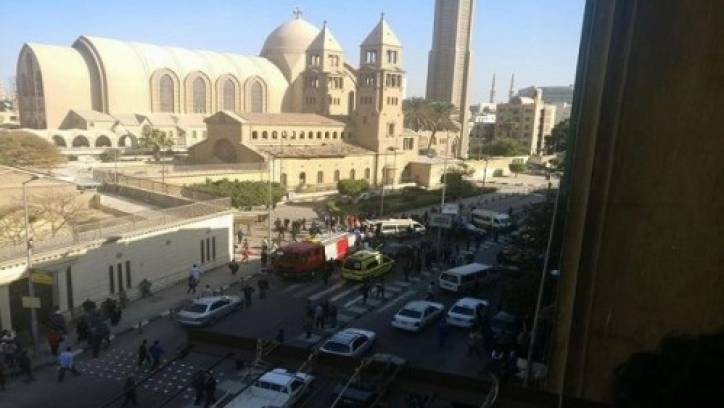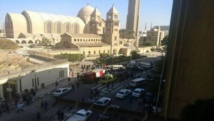At least 31 people were also wounded in the blast, the health ministry said, as the attack drew condemnation from political and religious leaders and led President Abdel Fattah al-Sisi to declare three days of national mourning.
The bombing hit around 10:00 am at the Saint Peter and Saint Paul Church, which is adjacent to Saint Mark's Cathedral, the seat of the Coptic pope Tawadros II.
A bomb made of 12 kilos of TNT appeared to have been behind the explosion, security officials said.
The blast shattered the church's glass windows and scattered pews through the main prayer hall. Blood stains could be seen on the floors, where shoes and other belongings lay scattered.
"I was leaving the church and then I heard a loud explosion and there was a lot of smoke and people started running and screaming," Jackline Abdel Shahid, one of the survivors of the blast, told AFP at the scene.
"The ambulances started coming, and they kept bringing out body parts. The floor was covered in blood, and the whole church was stained with blood, broken glass everywhere, everyone screaming, torn clothes," she said.
- 'Where were security forces?' -
Gebrail Ebeid, who has been headed to services when the bombing took place, accused Egypt's government of not doing enough to protect the Christian community.
"This is the government's responsibility. The explosion happened inside the church," said Ebeid.
"How can this happen? What did I do to have this happen as I am going into the church?" he asked. "Where were the security forces? They're filling the streets now, but it's too late."
An angry group of about 25 people had gathered near the area to protest after the bombing, chanting for the resignation of Egypt's interior minister.
It was the worst attack on the Coptic Christian community since a 2011 suicide bombing killed more than 20 worshippers outside a church in the coastal city of Alexandria.
Interior Minister Magdy Abdel Ghaffar rushed to the area after the blast and Prime Minister Sherif Ismail called on security services to quickly find those responsible.
"The nation's Muslim and Christian citizens stand together against this black terrorism," Ismail said in the statement.
Sisi also condemned the attack, saying in a statement: "Egypt will only emerge stronger and more unified from these events."
Sheikh Ahmed al-Tayeb, the head of Egypt's top Sunni Muslim authority Al-Azhar, said the "vile terrorist explosion" was "a great crime against all Egyptians".
Egyptian media reported that Tawadros was returning early from a visit to Switzerland following the attack.
The church that was targeted "is deeply loved by many Coptic faithful in Cairo and it has a regular parish presence," said Bishop Angaelos, the General Bishop for the Coptic Church in Britain.
- 'An easier target' -
He said services had been held in the church on Sunday morning, while Saint Mark's Cathedral was being renovated.
"It's an easier target because its entrance is outside the precincts" of the cathedral.
Copts have faced persecution and discrimination dating back to the 30-year rule of Hosni Mubarak, who was toppled by a popular uprising in 2011.
Dozens have been killed in recent years in sectarian attacks and clashes throughout Egypt.
In April 2013, two people died in clashes with local residents outside Saint Mark's Cathedral, the spiritual heart of the largest Christian minority in the Middle East.
Islamists in August 2013 attacked churches and homes of Copts in retaliation for the dispersal by security forces of Cairo protest camps of supporters of Mohamed Morsi, the Islamist president deposed by then-army chief Sisi.
Enraged by the crackdown in which hundreds died, mobs lashed out at Copts in the Upper Egypt province of Minya, accusing them of backing the military.
More than 40 churches were attacked nationwide, with most attacks in Minya and Assiut, Human Rights Watch said at the time.
Security forces have been the main target of attacks following Morsi's ouster.
Most of the attacks are conducted in the Sinai Peninsula by a branch of the Islamic State group, although militants have also targeted security forces and government officials in Cairo.
On Friday, six people died in a bombing next to a police checkpoint in the Talibiya area of Cairo shortly before Muslim weekly prayers when the streets are mostly empty.
-------------------------------------------------------------------------------------------------------
The bombing hit around 10:00 am at the Saint Peter and Saint Paul Church, which is adjacent to Saint Mark's Cathedral, the seat of the Coptic pope Tawadros II.
A bomb made of 12 kilos of TNT appeared to have been behind the explosion, security officials said.
The blast shattered the church's glass windows and scattered pews through the main prayer hall. Blood stains could be seen on the floors, where shoes and other belongings lay scattered.
"I was leaving the church and then I heard a loud explosion and there was a lot of smoke and people started running and screaming," Jackline Abdel Shahid, one of the survivors of the blast, told AFP at the scene.
"The ambulances started coming, and they kept bringing out body parts. The floor was covered in blood, and the whole church was stained with blood, broken glass everywhere, everyone screaming, torn clothes," she said.
- 'Where were security forces?' -
Gebrail Ebeid, who has been headed to services when the bombing took place, accused Egypt's government of not doing enough to protect the Christian community.
"This is the government's responsibility. The explosion happened inside the church," said Ebeid.
"How can this happen? What did I do to have this happen as I am going into the church?" he asked. "Where were the security forces? They're filling the streets now, but it's too late."
An angry group of about 25 people had gathered near the area to protest after the bombing, chanting for the resignation of Egypt's interior minister.
It was the worst attack on the Coptic Christian community since a 2011 suicide bombing killed more than 20 worshippers outside a church in the coastal city of Alexandria.
Interior Minister Magdy Abdel Ghaffar rushed to the area after the blast and Prime Minister Sherif Ismail called on security services to quickly find those responsible.
"The nation's Muslim and Christian citizens stand together against this black terrorism," Ismail said in the statement.
Sisi also condemned the attack, saying in a statement: "Egypt will only emerge stronger and more unified from these events."
Sheikh Ahmed al-Tayeb, the head of Egypt's top Sunni Muslim authority Al-Azhar, said the "vile terrorist explosion" was "a great crime against all Egyptians".
Egyptian media reported that Tawadros was returning early from a visit to Switzerland following the attack.
The church that was targeted "is deeply loved by many Coptic faithful in Cairo and it has a regular parish presence," said Bishop Angaelos, the General Bishop for the Coptic Church in Britain.
- 'An easier target' -
He said services had been held in the church on Sunday morning, while Saint Mark's Cathedral was being renovated.
"It's an easier target because its entrance is outside the precincts" of the cathedral.
Copts have faced persecution and discrimination dating back to the 30-year rule of Hosni Mubarak, who was toppled by a popular uprising in 2011.
Dozens have been killed in recent years in sectarian attacks and clashes throughout Egypt.
In April 2013, two people died in clashes with local residents outside Saint Mark's Cathedral, the spiritual heart of the largest Christian minority in the Middle East.
Islamists in August 2013 attacked churches and homes of Copts in retaliation for the dispersal by security forces of Cairo protest camps of supporters of Mohamed Morsi, the Islamist president deposed by then-army chief Sisi.
Enraged by the crackdown in which hundreds died, mobs lashed out at Copts in the Upper Egypt province of Minya, accusing them of backing the military.
More than 40 churches were attacked nationwide, with most attacks in Minya and Assiut, Human Rights Watch said at the time.
Security forces have been the main target of attacks following Morsi's ouster.
Most of the attacks are conducted in the Sinai Peninsula by a branch of the Islamic State group, although militants have also targeted security forces and government officials in Cairo.
On Friday, six people died in a bombing next to a police checkpoint in the Talibiya area of Cairo shortly before Muslim weekly prayers when the streets are mostly empty.
-------------------------------------------------------------------------------------------------------









 Home
Home Politics
Politics











